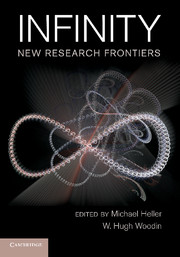Book contents
- Frontmatter
- Contents
- Contributors
- Preface
- Acknowledgments
- Introduction
- I Perspectives on Infinity from History
- II Perspectives on Infinity from Mathematics
- III Technical Perspectives on Infinity from Advanced Mathematics
- IV Perspectives on Infinity from Physics and Cosmology
- 7 Some Considerations on Infinity in Physics
- 8 Cosmological Intimations of Infinity
- 9 Infinity and the Nostalgia of the Stars
- 10 Infinities in Cosmology
- V Perspectives on Infinity from Philosophy and Theology
- Index
- References
10 - Infinities in Cosmology
Published online by Cambridge University Press: 07 June 2011
- Frontmatter
- Contents
- Contributors
- Preface
- Acknowledgments
- Introduction
- I Perspectives on Infinity from History
- II Perspectives on Infinity from Mathematics
- III Technical Perspectives on Infinity from Advanced Mathematics
- IV Perspectives on Infinity from Physics and Cosmology
- 7 Some Considerations on Infinity in Physics
- 8 Cosmological Intimations of Infinity
- 9 Infinity and the Nostalgia of the Stars
- 10 Infinities in Cosmology
- V Perspectives on Infinity from Philosophy and Theology
- Index
- References
Summary
Introduction
Traditionally, the problem of infinity in cosmology appeared in the form of questions concerning space and time. These questions were notoriously difficult and led to paradoxes. Does space extend to infinity? If so, how can something by definition beyond empirical control be a subject matter of scientific inquiry? If not, what is beyond the edges of space? Similar questions were involved in the time problem: If time had a beginning, what was “before” the beginning? If the age of the universe is infinite, what supplies infinite amounts of energy indispensable to compensate for dissipative losses? Relativistic cosmology did not solve these questions; it only tamed them by elaborating strict mathematical tools, in terms of which they could be expressed while awaiting more empirical data that would help to further elucidate them.
Quite recently, the problem of infinity has emerged in speculations in cosmology on the, so to speak, metalevel. Wanting to neutralize difficult problems related to the initial conditions of the temporal beginning of the universe, some people started to speculate about “all possible universes.” If all possibilities are implemented somewhere in the huge collection of “everything,” then even the most intricate questions lose their disturbing force. The strangest things just happen (an infinite number of times) someplace. If we live in this extremely strange world of ours, this is because “more usual” worlds do not admit the existence of the “intelligent observer.”
Information
- Type
- Chapter
- Information
- InfinityNew Research Frontiers, pp. 218 - 230Publisher: Cambridge University PressPrint publication year: 2011
References
Accessibility standard: Unknown
Why this information is here
This section outlines the accessibility features of this content - including support for screen readers, full keyboard navigation and high-contrast display options. This may not be relevant for you.Accessibility Information
- 1
- Cited by
